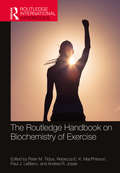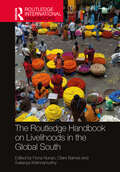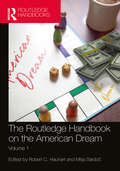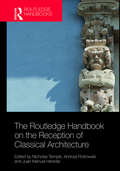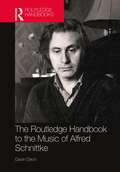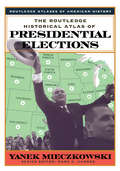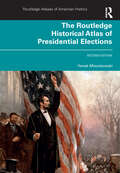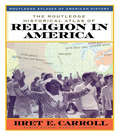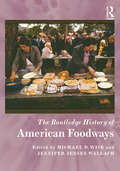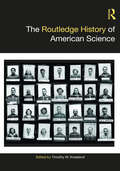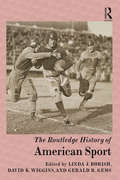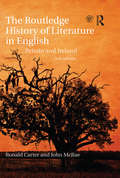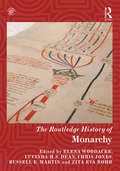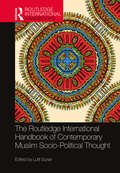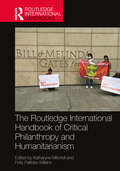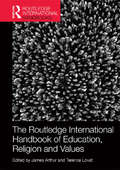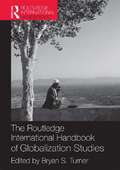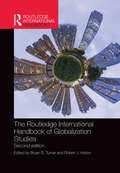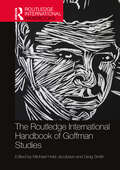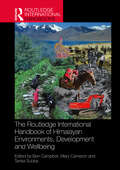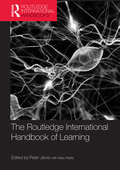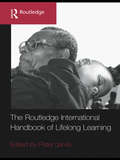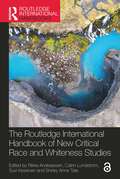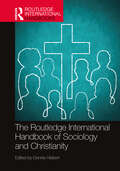- Table View
- List View
The Routledge Handbook on Biochemistry of Exercise (Routledge International Handbooks)
by Peter M. Tiidus Rebecca E. K. MacPherson Paul J. LeBlanc Andrea R. JosseFrom its early beginnings in the 1960s, the academic field of biochemistry of exercise has expanded beyond examining and describing metabolic responses to exercise and adaptations to training to include a wide understanding of molecular biology, cell signalling, interorgan communication, stem cell physiology, and a host of other cellular and biochemical mechanisms regulating acute responses and chronic adaptations related to exercise performance, human health/disease, nutrition, and cellular functioning. The Routledge Handbook on Biochemistry of Exercise is the first book to pull together the full depth and breadth of this subject and to update a rapidly expanding field of study with current issues and controversies and a look forward to future research directions. Bringing together many experts and leading scientists, the book emphasizes the current understanding of the underlying metabolic, cellular, genetic, and cell signalling mechanisms associated with physical activity, exercise, training, and athletic performance as they relate to, interact with, and regulate cellular and muscular adaptations and consequent effects on human health/disease, nutrition and weight control, and human performance. With more emphasis than ever on the need to be physically active and the role that being active plays in our overall health from a whole-body level down to the cell, this book makes an important contribution for scholars, medical practitioners, nutritionists, and coaches/trainers working in research and with a wide range of clients. This text is important reading for all students, scholars, and others with an interest in health, nutrition, and exercise/training in general.
The Routledge Handbook on Livelihoods in the Global South (Routledge International Handbooks)
by Fiona Nunan Sukanya Krishnamurthy Clare BarnesThe Routledge Handbook on Livelihoods in the Global South presents a unique, timely, comprehensive overview of livelihoods in low- and middle-income countries. Since their widespread adoption in the 1990s, livelihoods perspectives, frameworks and methods have influenced diverse areas of research, policy and practice. The concept of livelihoods reflects the complexity of strategies and practices used by individuals, households and communities to meet their needs and live their lives. The Handbook brings together insights and critical analysis from diverse approaches and experiences, learning from research and practice over the last 30 years. The Handbook comprises an introductory section on key concepts and frameworks, followed by five parts, on researching livelihoods, negotiating livelihoods, generating livelihoods, enabling livelihoods and contextualising livelihoods. The introduction provides readers with an appreciation of concepts researched and applied in the five parts, including chapters on vulnerability and resilience, social capital and networks, and institutions. Each part reflects the diversity of approaches taken to understanding livelihoods, whilst recognising commonalities, including the centrality of power in shaping, enabling and constraining livelihoods. The book also reflects diversity of context, including conflict, climate change and religion, as well as in generating livelihoods, through agriculture, small-scale mining and pastoralism. The aim of each chapter is to provide a critically informed introduction and overview of key concepts, issues and debates of relevance to the topic, with each chapter concluding with suggestions for further reading. It will be an essential resource to students, researchers and practitioners of international development and related fields. Researchers and practitioners will also benefit from the book's diverse disciplinary contributions and by the wide and contemporary coverage.
The Routledge Handbook on the American Dream: Volume 1
by Robert C. Hauhart; Mitja SardočWhat do we mean by the American dream? Can we define it? Or does any discussion of the phrase end inconclusively, the solid turned liquid—like ice melting? Do we know whether the American dream motivates and inspires or, alternately, obscures and deceives? The Routledge Handbook on the American Dream offers distinctive, authoritative, original essays by well-known scholars that address the social, economic, historical, philosophic, legal, and cultural dimensions of the American dream for the twenty-first century. The American dream, first discussed and defined in print by James Truslow Adams’s The Epic of America (1931), has become nearly synonymous with being American. Adams’s definition, although known to scholars, is often lost in our ubiquitous use of the term. When used today, the iconic phrase seems to encapsulate every fashion, fad, trend, association, or image the user identifies with the United States or American life. The American dream’s ubiquity, though, argues eloquently for a deeper understanding of its heritage, its implications, and its impact—to be found in this first research handbook ever published on the topic.
The Routledge Handbook on the Reception of Classical Architecture
by Nicholas Temple Andrzej Piotrowski Juan Manuel HerediaThis is the first comprehensive study of the reception of classical architecture in different regions of the world. Exploring the impact of colonialism, trade, slavery, religious missions, political ideology and intellectual/artistic exchange, the authors demonstrate how classical principles and ideas were disseminated and received across the globe. By addressing a number of contentious or unresolved issues highlighted in some historical surveys of architecture, the chapters presented in this volume question long-held assumptions about the notion of a universally accepted ‘classical tradition’ and its broadly Euro-centric perspective. Featuring thirty-two chapters written by international scholars from China, Europe, Turkey, North America, Mexico, Australia and New Zealand, the book is divided into four sections: 1) Transmission and re-conceptualisation of classical architecture; 2) Classical influence through colonialism, political ideology and religious conversion; 3) Historiographical surveys of geographical regions; and 4) Visual and textual discourses. This fourfold arrangement of chapters provides a coherent structure to accommodate different perspectives of classical reception across the world, and their geographical, ethnographic, ideological, symbolic, social and cultural contexts. Essays cover a wide geography and include studies in Italy, France, England, Scotland, the Nordic countries, Greece, Austria, Portugal, Romania, Germany, Poland, India, Singapore, China, the USA, Mexico, Brazil, New Zealand and Australia. Other essays in the volume focus on thematic issues or topics pertaining to classical architecture, such as ornament, spolia, humanism, nature, moderation, decorum, heresy and taste. An essential reference guide, The Routledge Handbook on the Reception of Classical Architecture makes a major contribution to the study of architectural history in a new global context.
The Routledge Handbook to the Music of Alfred Schnittke (Routledge Russian and East European Music and Culture)
by Gavin DixonThe Routledge Handbook to the Music of Alfred Schnittke is a comprehensive study of the work of one of the most important Russian composers of the late 20th century. Each piece is discussed in detail, with particular attention to the composer’s groundbreaking polystylism, as well as his unique approach to musical symbolism and his deep engagement with Christian themes. This is the first publication to look at Schnittke’s output in its entirety, and for most works it represents either the first ever published analysis or the first in a language other than Russian. The volume presents new research from the Ivashkin-Schnittke Archive at Goldsmiths, University of London and the collection of Schnittke’s compositional sketches at the Julliard Library in New York. It also draws on the substantial research on Schnittke’s music published in the Russian language. Including a work list and bibliography of primary and secondary sources, this is an essential reference for all those interested in Russian music, 20th-century music and performance studies.
The Routledge Historical Atlas of Presidential Elections (Routledge Atlases of American History)
by Yanek MieczkowskiFirst Published in 2001. Routledge is an imprint of Taylor & Francis, an informa company.
The Routledge Historical Atlas of Presidential Elections (Routledge Atlases of American History)
by Yanek MieczkowskiNow in its second edition, The Routledge Historical Atlas of Presidential Elections covers each race for the presidency with brisk, lively narratives up to the election of 2016. Filled with more than 100 full-color maps and illustrations, this updated volume is an indispensable resource for learning about the suspense-filled races to gain America’s highest office. Distinguished presidential historian Yanek Mieczkowski captures intriguing details about candidates, issues, and campaigns, allowing readers to experience the drama of every contest. The colorful maps that put state-by-state results at readers’ fingertips show geographic voting trends during the country’s history. The presidency is America’s greatest political prize, and this book describes how candidates have won it—including changes in electoral strategies and campaign practices over the years. This text offers a treasure trove of historical information, such as: The early tradition of the "mute" candidate The period where just one effective political party existed nationwide One race that witnessed an astounding 80 percent voter turnout A popular-vote victory of 39.9 percent that triggered secession The emergence of the "front-porch" campaign A third-party candidate who got more votes than the incumbent president The impact of radio, television, and the Internet on the election process This book is essential reading for students of American history and the U.S. presidency.
The Routledge Historical Atlas of Religion in America (Routledge Atlases of American History)
by Brett CarrollFirst Published in 2001. Routledge is an imprint of Taylor & Francis, an informa company.
The Routledge History of American Foodways (Routledge Histories Ser.)
by Michael D. Wise Jennifer Jensen Wallach Lindsey R. SwindallThe Routledge History of American Foodways provides an important overview of the main themes surrounding the history of food in the Americas from the pre-colonial era to the present day. By broadly incorporating the latest food studies research, the book explores the major advances that have taken place in the past few decades in this crucial field. The volume is composed of four parts. The first part explores the significant developments in US food history in one of five time periods to situate the topical and thematic chapters to follow. The second part examines the key ingredients in the American diet throughout time, allowing authors to analyze many of these foods as items that originated in or dramatically impacted the Americas as a whole, and not just the United States. The third part focuses on how these ingredients have been transformed into foods identified with the American diet, and on how Americans have produced and presented these foods over the last four centuries. The final section explores how food practices are a means of embodying ideas about identity, showing how food choices, preferences, and stereotypes have been used to create and maintain ideas of difference. Including essays on all the key topics and issues, The Routledge History of American Foodways comprises work from a leading group of scholars and presents a comprehensive survey of the current state of the field. It will be essential reading for all those interested in the history of food in American culture.
The Routledge History of American Science (Routledge Histories)
by Timothy W. KneelandThe Routledge History of American Science provides an essential companion to the most significant themes within the subject area. The field of the history of science continues to grow and expand into new areas and to adopt new theories to explain the role of science and its connections to politics, economics, religion, social structures, intellectual history, and art. This book takes North America as its focus and explores the history of science in the region both nationally and internationally with 27 chapters from a range of disciplines. Part I takes a chronological look at the history of science in America, from its origins in the Atlantic World, through to the American Revolution, the Civil War, the World Wars, and ending in the postmodern era. Part II discusses American science in practice, from scientists as practitioners, laboratories and field experiences, to science and religion. Part III examines the relationship between science and power. The chapters touch on the intersection of science and imperialism, environmental science in U.S. politics, as well as capitalism and science. Finally, Part IV explores how science is embedded in the culture of the United States with topics such as the growing importance of climate science, the role of scientific racism, the construction of gender, and how science and disability studies converge. The final chapter reviews the way in which society has embraced or rejected science, with reflections on the recent pandemic and what it may mean for the future of American science. This book fills a much-needed gap in the history and historiography of American science studies and will be an invaluable guide for any student or researcher in the history of science in America.
The Routledge History of American Sport
by Gerald R. Gems Linda J. Borish David K. WigginsThe Routledge History of American Sport provides the first comprehensive overview of historical research in American sport from the early Colonial period to the present day. Considering sport through innovative themes and topics such as the business of sport, material culture and sport, the political uses of sport, and gender and sport, this text offers an interdisciplinary analysis of American leisure. Rather than moving chronologically through American history or considering the historical origins of each sport, these topics are dealt with organically within thematic chapters, emphasizing the influence of sport on American society. The volume is divided into eight thematic sections that include detailed original essays on particular facets of each theme. Focusing on how sport has influenced the history of women, minorities, politics, the media, and culture, these thematic chapters survey the major areas of debate and discussion. The volume offers a comprehensive view of the history of sport in America, pushing the field to consider new themes and approaches as well. Including a roster of contributors renowned in their fields of expertise, this ground-breaking collection is essential reading for all those interested in the history of American sport.
The Routledge History of Literature in English: Britain and Ireland
by Ronald Carter John McRaeThe Routledge History of Literature in English covers the main developments in the history of British and Irish literature, with accompanying language notes which explore the interrelationships between language and literature at each stage. With a span from AD 600 to the present day, it emphasises the growth of literary writing, its traditions, conventions and changing characteristics, and includes literature from the margins, both geographical and cultural. Extensive quotations from poetry, prose and drama underpin the narrative. The third edition covers recent developments in literary and cultural theory, and features: a new chapter on novels, drama and poetry in the 21st century; examples of analysis of key texts drawn from across the history of British and Irish literature, including material from Chaucer, Shakespeare, John Keats and Virginia Woolf; an extensive companion website including extra language notes and key text analysis; lists of Booker, Costa and Nobel literature prize winners; and an A-Z of authors and topics. The Routledge History of Literature in English is an invaluable reference for any student of English literature and language.
The Routledge History of Monarchy (Routledge Histories)
by Chris Jones Russell Martin Elena Woodacre Lucinda H.S. Dean Zita RohrThe Routledge History of Monarchy draws together current research across the field of royal studies, providing a rich understanding of the history of monarchy from a variety of geographical, cultural and temporal contexts. Divided into four parts, this book presents a wide range of case studies relating to different aspects of monarchy throughout a variety of times and places, and uses these case studies to highlight different perspectives of monarchy and enhance understanding of rulership and sovereignty in terms of both concept and practice. Including case studies chosen by specialists in a diverse array of subjects, such as history, art, literature, and gender studies, it offers an extensive global and interdisciplinary approach to the history of monarchy, providing a thorough insight into the workings of monarchies within Europe and beyond, and comparing different cultural concepts of monarchy within a variety of frameworks, including social and religious contexts. Opening up the discussion of important questions surrounding fundamental issues of monarchy and rulership, The Routledge History of Monarchy is the ideal book for students and academics of royal studies, monarchy, or political history.
The Routledge International Handbook of Contemporary Muslim Socio-Political Thought (Routledge International Handbooks)
by Lutfi SunarThis volume unfolds the ebbs and flows of Muslim thought in different regions of the world, as well as the struggles between the different intellectual discourses that have surfaced against this backdrop. With a focus on Turkey, Egypt, Iran and the Indian subcontinent – regions that, in spite of their particular histories and forms of thought, are uniquely placed as a mosaic that illustrates the intertwined nature of the development of Muslim socio-political thought – it sheds light on the swing between right and left in different regions, the debates surrounding nationalism, the influence of socialism and liberalism, the rise of Islamism and the conflict between state bureaucracy and social movements. Exploring themes of civil society and democracy, it also considers current trends in Muslim thought and possible future directions. As such, it will appeal to scholars across the fields of sociology, anthropology, political science, history and political economy, as well as those with interests in the study of religion, the development of Muslim thought, and the transformation of Muslim societies in recent decades.
The Routledge International Handbook of Critical Philanthropy and Humanitarianism (Routledge International Handbooks)
by Katharyne Mitchell Polly Pallister-WilkinsThis handbook builds a shared understanding of the troubling politics of philanthropy and the disturbing history and practices of humanitarianism. While historical work on philanthropy has long suggested a link between imperial rule and humanitarian aid, these insights have only recently been brought to bear on contemporary forms of giving. In this book, contributors link the long history of colonial philanthropy to current foundations and their programs in education, health, migrant care, and other social initiatives. They argue that both philanthropy and humanitarianism often function to consolidate market rule, consolidating and expanding liberal market rationalities of neoliberal entrepreneurialism to a widening population and set of institutions. Philanthropy and humanitarianism share a history, growing together out of modernist socio-economic relations and modes of imperial rule. However, the histories and contemporary politics of the two have not been brought together with such breadth or under such a critical lens before. Discussing philanthropy and humanitarianism together, combining both historical scope and contemporary iterations, highlights continuities and convergences—making the volume a unique introduction and critical overview of critical work in these sister-fields.
The Routledge International Handbook of Education, Religion and Values (Routledge International Handbooks of Education)
by James Arthur Terence LovatThe academic fields of religion and values have become the focus of renewed interest in contemporary thinking about human activity and its motivations. The Routledge International Handbook of Education, Religion and Values explores and expands upon a range of international research related to this revival. The book provides an authoritative overview of global issues in religion and values, surveying the state of the academic area in contributions covering a wide range of topics. It includes emerging, controversial, and cutting-edge contributions, as well as investigations into more established areas. International authorities Arthur and Lovat have brought together experts from across the world to examine the complexity of the field of study. The handbook is organised around four key topics, which focus on both the importance of religion and values as broad fields of human enquiry, as well as in their application to education, inter-agency work and cross-cultural endeavours: -The Conceptual World of Religion and Values -Religion and Values in Education -Religion and Values in Inter-agency Work -Religion and Values in Cross-cultural Work. This comprehensive reference work combines theoretical and empirical research of international significance, and will be valuable reading for students, researchers and academics in the field of education.
The Routledge International Handbook of Globalization Studies: Second Edition (Routledge International Handbooks)
by Bryan S. TurnerThe Routledge International Handbook of Globalization Studies offers students clear and informed chapters on the history of globalization and key theories that have considered the causes and consequences of the globalization process. There are substantive sections looking at demographic, economic, technological, social and cultural changes in globalization. The handbook examines many negative aspects – new wars, slavery, illegal migration, pollution and inequality – but concludes with an examination of responses to these problems through human rights organizations, international labour law and the growth of cosmopolitanism. There is a strong emphasis on interdisciplinary approaches with essays covering sociology, demography, economics, politics, anthropology and history. The Handbook, written in a clear and direct style, will appeal to a wide audience. The extensive references and sources will direct students to areas of further study.
The Routledge International Handbook of Globalization Studies: Second edition (Routledge International Handbooks)
by Bryan S. Turner Robert J. HoltonThe second edition of the Routledge International Handbook of Globalization Studies offers students clear and informed chapters on the history of globalization and key theories that have considered the causes and consequences of the globalization process. There are substantive sections looking at demographic, economic, technological, social and cultural changes in globalization. The handbook examines many negative aspects – new wars, slavery, illegal migration, pollution and inequality – but concludes with an examination of responses to these problems through human rights organizations, international labour law and the growth of cosmopolitanism. There is a strong emphasis on interdisciplinary approaches with essays covering sociology, demography, economics, politics, anthropology and history. The second edition has been completely revised and features important new thinking on themes such as Islamophobia and the globalization of religious conflict, shifts in global energy production such as fracking, global inequalities, fiscal transformations of the state and problems of taxation, globalization and higher education, and an analysis of the general sense of catastrophe that surrounds contemporary understandings of the consequences of a global world.
The Routledge International Handbook of Goffman Studies (Routledge International Handbooks)
by Greg Smith Michael Hviid JacobsenThis book explores the fertility and enigma of Erving Goffman’s sociological reasoning and its capacity to shed fresh light on the fundamental features of human sociality. Thematically arranged, it brings together the work of leading scholars of Goffman’s work to explore the concepts and themes that define Goffman’s analytical preoccupations, examining the ways these ideas have shaped significant fields of study and situating Goffman’s sociology in comparison to some eminent thinkers often linked with his name. Through a series of chapters informed by the same inventive and imaginative spirit characteristic of Goffman’s sociology, the book presents fresh perspectives on his contribution to the field and reveals the value of his thought for a variety of disciplines now increasingly aware of the importance of Goffman’s sociology to a range of social phenomena. A fresh perspective on the legacy of one of sociology’s most important figures, The Routledge International Handbook of Goffman Studies will appeal to scholars across the social sciences with interests in interactionist and micro-sociological perspectives.
The Routledge International Handbook of Himalayan Environments, Development and Wellbeing (Routledge International Handbooks)
by Mary Cameron Ben Campbell Tanka SubbaShifting dynamics of peoples, livelihoods and territories, influenced by global warming, require new ways of thinking and new kinds of politics beyond the sovereignties of idealized traditional European nation-states. The Routledge International Handbook of Himalayan Environments, Development and Wellbeing features over 70 scholars from the social sciences, humanities and natural sciences who explore the interrelationships between environmental change, development and wellbeing across the entire Himalayan region – from the Indian Himalayas in the east to Bhutan, Nepal, Tibet (TAR), India and Gilgit-Baltistan in the west.Within over 50 chapters, the handbook presents engaging field-based research on the region’s socio-cultural diversity, climate adaptation and socio-economic transformation. It examines creative ways Himalayan communities adapt, seek wellbeing and respond to environmental and development challenges. Lessons about learning from Indigenous and local peoples, about governance of forests and water, and grassroots conservation practices from the Himalayan region can help inform global networks of researchers and practitioners.The handbook will interest scholars, students, stakeholders and the public about the evolving relationships between Himalayan peoples, territories and global warming, offering insights into people’s creative ways for understanding, adapting, and seeking wellbeing in environmental relations and development possibilities.
The Routledge International Handbook of Learning (Routledge International Handbooks Of Education Ser.)
by Mary Watts Peter JarvisAs our understanding of learning focuses on the whole person rather than individual aspects of learning, so the process of learning is beginning to be studied from a wide variety of perspectives and disciplines. This handbook presents a comprehensive overview of the contemporary research into learning: it brings together a diverse range of speciali
The Routledge International Handbook of Lifelong Learning (Routledge International Handbooks of Education)
by Peter JarvisAs lifelong learning grows in popularity, few comprehensive pictures of the phenomenon have emerged. The Routledge International Handbook of Lifelong Learning provides a disciplined and complete overview of lifelong learning internationally. The theoretical structure puts the learner at the centre and the book emanates from there, pointing to the social context beyond the learner.Up-to-the-minute syntheses from many of the leading international experts in the field give vital snapshots of this rapidly evolving subject from wide-ranging perspectives including: learning throughout life sites of lifelong learning modes of learning policies social movements issues in lifelong learning geographical dimensions. This authoritative volume, essential reading for academics in the field of Lifelong Learning, examines the complexities of the subject within a systematic global framework and places it in its socio-historic context.
The Routledge International Handbook of New Critical Race and Whiteness Studies (Routledge International Handbooks)
by Shirley Anne Tate Catrin Lundström Rikke Andreassen Suvi KeskinenSince its foundation as an academic field in the 1990s, critical race theory has developed enormously and has, among others, been supplemented by and (dis)integrated with critical whiteness studies. At the same time, the field has moved beyond its origins in Anglo-Saxon environments, to be taken up and re-developed in various parts of the world – leading to not only new empirical material but also new theoretical perspectives and analytical approaches. Gathering these new and global perspectives, this book presents a much-needed collection of the various forms, sophisticated theoretical developments and nuanced analyses that the field of critical race and whiteness theories and studies offers today. Organized around the themes of emotions, technologies, consumption, institutions, crisis, identities and on the margin, this presentation of critical race and whiteness theories and studies in its true interdisciplinary and international form provides the latest empirical and theoretical research, as well as new analytical approaches. Illustrating the strength of the field and embodying its future research directions, The Routledge International Handbook of New Critical Race and Whiteness Studies will appeal to scholars across the social sciences and humanities with interests in race and whiteness.
The Routledge International Handbook of New Critical Race and Whiteness Studies (Routledge International Handbooks)
by Shirley Anne Tate Catrin Lundström Rikke Andreassen Suvi KeskinenSince its foundation as an academic field in the 1990s, critical race theory has developed enormously and has, among others, been supplemented by and (dis)integrated with critical whiteness studies. At the same time, the field has moved beyond its origins in Anglo-Saxon environments, to be taken up and re-developed in various parts of the world – leading to not only new empirical material but also new theoretical perspectives and analytical approaches. Gathering these new and global perspectives, this book presents a much-needed collection of the various forms, sophisticated theoretical developments and nuanced analyses that the field of critical race and whiteness theories and studies offers today. Organized around the themes of emotions, technologies, consumption, institutions, crisis, identities and on the margin, this presentation of critical race and whiteness theories and studies in its true interdisciplinary and international form provides the latest empirical and theoretical research, as well as new analytical approaches. Illustrating the strength of the field and embodying its future research directions, The Routledge International Handbook of New Critical Race and Whiteness Studies will appeal to scholars across the social sciences and humanities with interests in race and whiteness.Chapter 34 of this book is freely available as a downloadable Open Access PDF at http://www.taylorfrancis.com under a Creative Commons [Attribution-Non Commercial-No Derivatives (CC-BY-NC-ND)] 4.0 license.
The Routledge International Handbook of Sociology and Christianity (Routledge International Handbooks)
by Dennis HiebertThe Routledge International Handbook of Sociology and Christianity examines the intersection of the sociology of religion – a long-standing focus of sociology as a discipline – and Christianity – the world’s largest religion. An internationally representative and thematically comprehensive collection, it analyzes both the sociology of Christianity and Christian approaches to sociology, with attention to the Roman Catholic, Orthodox, and Protestant branches of Christianity. An authoritative, state-of-the-art review of current research, it is organized into five inter-connected thematic sections, considering the overlapping emergence of both the Christian religion and the social science, the conceptualization of and engagement with Christianity by sociological theory, the ways in which Christianity shapes and is shaped by various social institutions, the manner in which Christianity resists and promotes various forms of social change, and the identification, diagnosis, and correction of social problems by sociology and Christianity. This volume is an invaluable collection for scholars and advanced students, with special appeal for those working in the fields of sociology and social theory, as well as religious studies and theology
